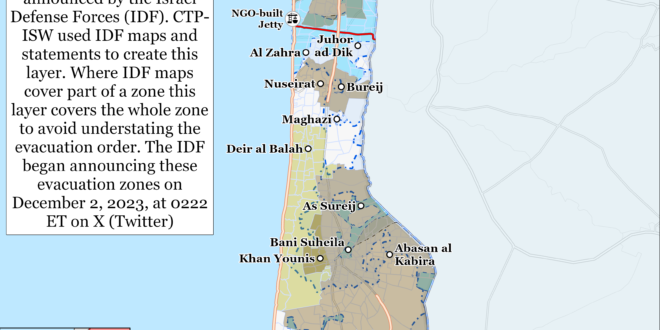The Israeli Security Cabinet approved an Israeli military response against Lebanese Hezbollah on July 28. The Israeli Security Cabinet authorized Israeli Prime Minister Benjamin Netanyahu and Defense Minister Yoav Gallant to determine the “manner and timing” of Israel’s retaliation for the July 27 rocket attack on Majdal Shams in the Israeli-controlled Golan Heights.[i] Lebanese Hezbollah likely conducted the attack, which killed 12 Israeli children.[ii] Hezbollah’s decisions—including the Hezbollah decision to shift to using more advanced weapons systems to attack Israel—increased the risk that a Hezbollah attack would cause significant Israeli civilian or military casualties, either by design or incidentally.[iii] Israeli military and political officials vowed immediately after the attack to respond “harshly” and ”take Hezbollah backwards.“[iv]
Unspecified Israeli security officials stated that Israel is ready to implement a response plan ”without delay” following the Security Cabinet’s approval.[v] Security cabinet approval is required by law for significant offensive military operations.[vi] The extent and strength of Israel’s response is unclear as of this writing, but the IDF reportedly formulated numerous attack scenarios that vary from ”more and less stringent” courses of IDF action. Previous IDF retaliatory strikes in this war have typically struck more sensitive targets located further north in Lebanon, such as higher value munitions or training sites.[vii] The attack on Majdal Shams on July 27 risks triggering a much larger or lengthy response, though, given that the Majdal Shams attack was the deadliest attack on Israeli civilians since the war began. A Hezbollah official told Western media that the group began moving its precision-guided missiles to avoid losing necessary assets in preparation for the attack.[viii]
Hezbollah officials are messaging that Hezbollah does not want an all-out war, likely in an effort to deescalate the situation. Hezbollah officials told Western media on July 29 that Hezbollah does not want a ”full-blown war” with Israel.[ix]
Israeli officials have also expressed that Israel does not want an all-out war at this time. Unspecified Israeli officials speaking with Israeli and Western media clarified on July 29 that Israel’s response will be “limited but significant” and that Israel has “no intention” of entering an all-out war with Hezbollah.[x] An Israeli diplomatic source told Reuters that Israeli leaders estimate that Israel’s response will not lead to war with Hezbollah as it would “not be in [Israel’s] interest at this point.”[xi]
Iran and its Axis of Resistance are trying to deter Israel from conducting an offensive into Lebanon following the likely Lebanese Hezbollah rocket attack that killed 12 Israeli children and teens in Majdal Shams, Golan Heights, on July 27. Former Islamic Revolutionary Guards Corps (IRGC) Commander Mohsen Rezaei warned on July 28 that a Israel-Hezbollah war would be “more dangerous” for Israel than Israel’s war with Hamas in the Gaza Strip.[xii] Iranian Ambassador to Lebanon Mojtaba Amani assessed on July 28 that the probability of Israel and Hezbollah going to war is “very low,” but noted that Iran “is not afraid of war” and can defend its Axis of Resistance.[xiii] Iranian-backed Iraqi militia Kataib Hezbollah separately warned on July 29 that the “new rules of engagement” in an Israel-Hezbollah war would “not be in the favor of Israel or the United States.”[xiv]
Unspecified Israeli negotiators told an Israeli military correspondent that they are pessimistic that Israel and Hamas will reach a ceasefire agreement following a meeting with mediators in Rome on July 28.[xv] Israel delivered a revised ceasefire proposal to the United States on July 27 according to a senior Israeli official and two unspecified sources with knowledge of the issue cited by Axios.[xvi] The revised proposal calls to establish a ”foreign mechanism” to prevent weapons from moving from the southern Gaza Strip to the northern Gaza Strip according to an unspecified Israeli official cited by Axios on July 27.[xvii] Israel issued a stipulation during negotiations in early July that would establish checkpoints along an unspecified strategic highway to prevent weapons smuggling.[xviii] The official added that the revised proposal also changed where Israeli forces will be deployed in the Gaza Strip during the first phase of the ceasefire.[xix] The New York Times cited seven officials ”involved in or briefed” on the negotiations in Rome on July 28 who claimed that the IDF’s presence in the Gaza Strip during the ceasefire is a barrier to reaching an agreement.[xx] Hamas claimed that Israel’s revised proposal was a ploy to procrastinate and delay a ceasefire deal.[xxi] An Israeli military correspondent reported that the July 28 meeting in Rome lasted two hours.[xxii]
Iranian Supreme Leader Ali Khamenei officially endorsed President Masoud Pezeshkian on July 28.[xxiii] Khamenei called on Pezeshkian to prioritize economic issues over sociocultural ones and to work “tirelessly” to solve the country’s economic problems, such as high inflation. Khamenei also called on Pezeshkian to continue former President Ebrahim Raisi’s foreign policy of strengthening relations with neighboring countries and to develop ties with unspecified African and Asian countries. Iran has sought to strengthen relations with several African countries, most notably Sudan, Niger, and Zimbabwe, in recent months.[xxiv]
Khamenei signaled openness to pursuing nuclear negotiations with the West, stating that Iran could choose to mend its relations with European countries if these countries stop their “bad behavior”—including imposing sanctions—on Iran.[xxv] Khamenei previously expressed support for both lifting and ”neutralizing” Western sanctions that target Iran’s nuclear program in a speech on July 21.[xxvi] Lifting sanctions refers to pursuing nuclear negotiations with the West, while neutralizing sanctions refers to mitigating and undermining the impact of sanctions, such as by promoting self-sufficiency and economic relations with regional and extra-regional states. The strategies of pursuing nuclear negotiations and trying to mitigate the effects of sanctions are not mutually exclusive. Khamenei previously urged Ebrahim Raisi administration officials to counter the impact of economic sanctions while simultaneously expressing support for sanctions-lifting nuclear negotiations.[xxvii] A new nuclear deal would not necessarily require the United States and its partners to lift all the sanctions they have imposed on Iran, such as sanctions tied to Iran’s drone and missile programs.
Pezeshkian reiterated his support for engaging in “constructive and effective interactions with the world” in a speech following Khamenei’s official endorsement of him as Iran’s nineth president.[xxviii] Pezeshkian repeatedly called for increasing international engagement with the West and endorsed a return to the Joint Comprehensive Plan of Action during his presidential campaign.[xxix] Pezeshkian also stressed his commitment to Khamenei’s vision for the Islamic Republic and called for national unity and cohesion to implement Khamenei’s “general policies.”[xxx] Pezeshkian’s inauguration ceremony will take place on July 30.[xxxi] Delegations from China, Iraq, Niger, Russia, and Syria, among other countries, will attend Pezeshkian’s inauguration.[xxxii] A Hamas delegation will also attend the inauguration.[xxxiii]
Iranian President Masoud Pezeshkian appointed former Mohammad Khatami and Hassan Rouhani administration officials as his first vice president and chief of staff, respectively.
Mohammad Reza Aref: Pezeshkian appointed Aref as his first vice president.[xxxiv] Aref is a 73-year-old reformist politician who served as former reformist President Mohammad Khatami’s first vice president between 2001 and 2005.[xxxv] Aref competed in the 2013 presidential election but withdrew in favor of former moderate President Hassan Rouhani.[xxxvi] Aref represented Tehran in Parliament between 2016 and 2020 and currently serves as a member of the Supreme Cultural Revolution Council and the Expediency Discernment Council.[xxxvii]
Mohsen Haji Mirzaei: Pezeshkian appointed Mirzaei as his chief of staff.[xxxviii] Mirzaei served as Rouhani’s education minister between 2019 and 2021.[xxxix]
Supreme Leader Ali Khamenei approved President Masoud Pezeshkian’s nomination of Abbas Araghchi as his foreign affairs minister, according to unspecified senior Iranian sources speaking to UK-based Amwaj Media.[xl] Pezeshkian has not publicly announced Araghchi’s nomination at the time of this writing, although IRGC-affiliated media reported on July 10 that Pezeshkian’s advisers had “almost reached the final conclusion” to nominate Araghchi.[xli] Araghchi played a prominent role in the nuclear negotiations with the West under the Hassan Rouhani administration and served as Rouhani’s deputy foreign affairs minister for policy between 2017 and 2021.[xlii] Pezeshkian’s nomination of Araghchi therefore underscores his intent to seriously pursue nuclear negotiations with the West. It is unclear whether the Iranian Parliament, which is currently dominated by hardliners, would approve Araghchi as foreign affairs minister. An unspecified senior Iranian source told Amwaj Media that Araghchi will likely face a “very, very difficult vote of confidence in this Parliament.”[xliii] Another source told Amwaj Media that the Iranian Parliament will likely approve Araghchi, but that it will “not be easy.”[xliv]
Iran and its revisionist partners are continuing to try to legitimize and bolster one another. Iranian officials congratulated Nicolas Maduro on July 29 on his re-election as the president of Venezuela.[xlv] Local and international observers have noted that the Maduro regime likely rigged the election to ensure Maduro’s victory.[xlvi]
Key Takeaways:
- Iran: Iranian President Masoud Pezeshkian appointed former Mohammad Khatami and Hassan Rouhani administration officials as his first vice president and chief of staff, respectively.
- Lebanon: The Israeli Security Cabinet approved an Israeli military response against Lebanese Hezbollah on July 28 as both Israeli officials and Hezbollah messaged that they do not want “all-out war” at this time.
- Gaza Strip: Unspecified Israeli negotiators told an Israeli military correspondent that they are pessimistic that Israel and Hamas will reach a ceasefire agreement following a meeting with mediators in Rome on July 28. Separately, the IDF detained nine Israeli soldiers on July 29 for alleged “substantial abuse” of a Palestinian fighter who the IDF detained for questioning.
- West Bank: The IDF Central Command commander said that the IDF has increased security around Israeli settlements and increased “offensive” measures against Palestinian fighters in the West Bank.
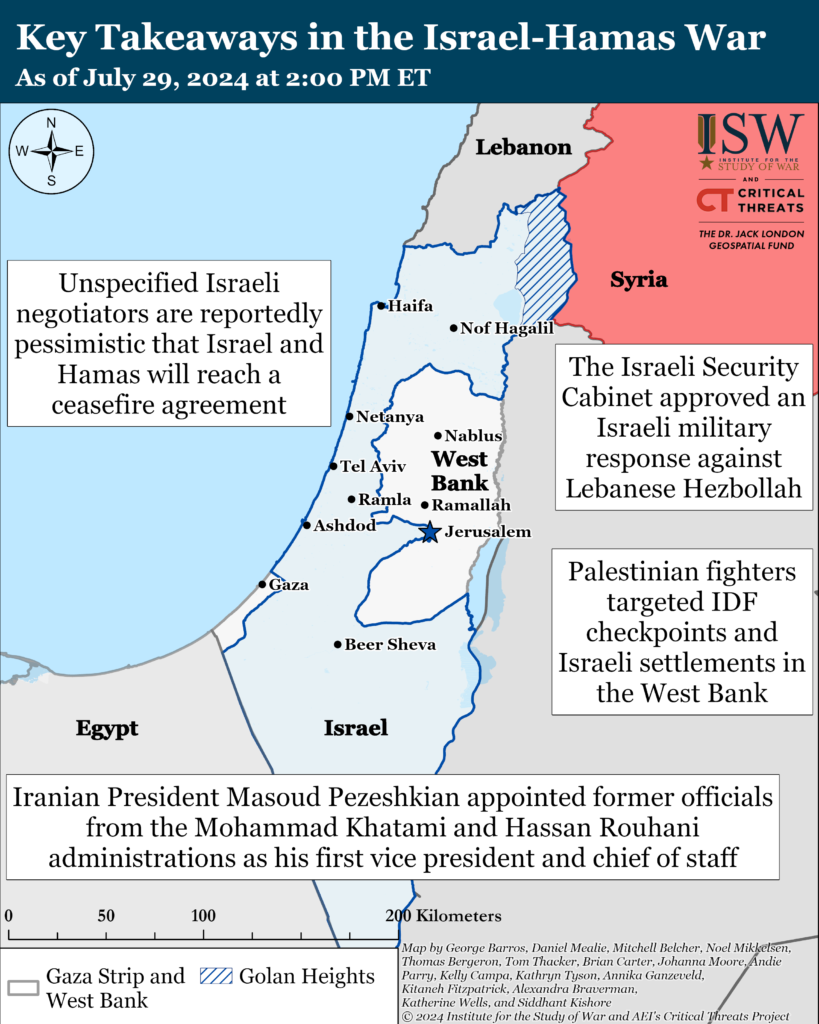
Gaza Strip
Axis of Resistance objectives:
Erode the will of the Israeli political establishment and public to sustain clearing operations in the Gaza Strip
Reestablish Hamas as the governing authority in the Gaza Strip
Palestinian militias and journalists claimed Israeli forces have continued operations in Tal al Hawa and al Sabra neighborhoods, south of Gaza City since CTP-ISW’s data cut off on July 28. A Palestinian journalist reported that Israeli armored units have been operating in Tal al Hawa and al Sabra for five days.[xlvii] The journalist reported that Israeli forces were seen at Dahdouh Roundabout, the University College of Applied Sciences, al Baraa Mosque, and the Nile Secondary School in Tal al Hawa.[xlviii] Palestinian Islamic Jihad (PIJ) claimed that its fighters fired a tandem-charge rocket-propelled grenade (RPG) at an Israeli Merkava tank operating near the Nile School.[xlix] Hamas claimed that its fighters also engaged Israeli forces in close quarters combat south of Tal al Hawa.[l] Hamas and PIJ also claimed separate mortar attacks targeting Israeli forces operating in unspecified areas of Tal al Hawa.
Palestinian militias continued to shell Israeli forces operating along the Netzarim Corridor, south of Gaza City. Palestinian militias conducted mortar and rocket attacks targeting Israeli forces and an Israel Defense Forces (IDF) combat outpost (COP).[lii]
The 98th Division continued to target Palestinian fighters and destroy militia infrastructure during clearing operations in Khan Younis on July 29. Israeli forces directed air strikes on Palestinian fighters operating in the area.[liii] Hamas and PIJ conducted a combined sniper attack targeting an Israeli soldier in eastern Khan Younis.[liv] Hamas and PIJ fighters also separately fired snipers at an Israeli soldier in Bani Suhaila.[lv] Hamas and PIJ conducted separate mortar attacks targeting Israeli forces operating east of Khan Younis.[lvi]
The 162nd Division engaged Palestinian fighters in close quarters combat and directed airstrikes in Rafah during clearing operations on July 29.[lvii] Hamas fighters fired a Red Arrow anti-tank guided missile at a Merkava tank operating near al Hussam tower in western Rafah.[lviii]
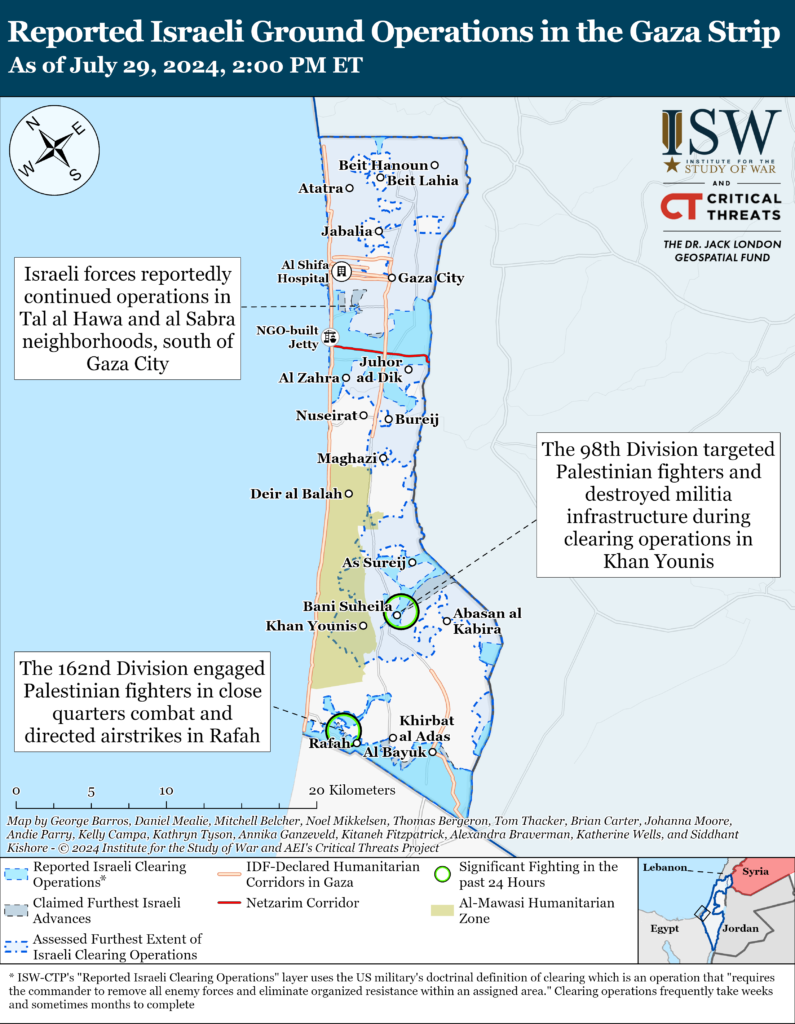
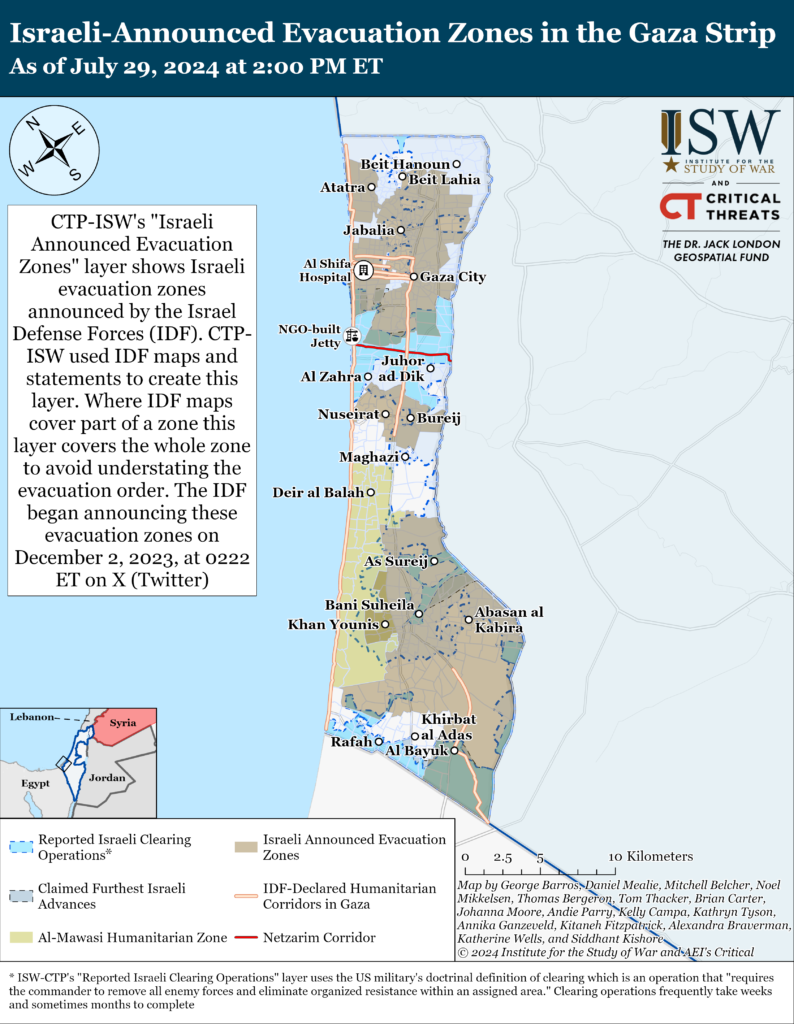
Turkish President Recep Erdogan suggested that Turkey may send forces to Israel in support of Palestinians during a Justice and Development party townhall on July 28.[lix] Erdogan claimed that Turkey would intervene as it had in Nagorno-Karabakh and Libya. Justice and Development Party officials did not respond to requests for a comment. Erdogan may have been attempting to appease a domestic audience instead of articulating foreign policy.
The IDF detained nine Israeli soldiers on July 29 for alleged “substantial abuse” of a Palestinian fighter who the IDF detained for questioning.[lx] The Palestinian fighter was detained during fighting in the Gaza Strip, classified as an unlawful combatant, and transferred to Sde Teiman Detention Center to serve out a “permanent” prison sentence. The fighter was found at Sde Teiman in critical condition three weeks ago and was transferred to a hospital where he underwent surgery, according to an Israeli military correspondent.[lxi] Israeli protesters stormed the Sde Teiman Detention Center in protest of the and demanded their release.[lxii] IDF Chief of Staff Lieutenant General Herzi Halevi voiced his support for the investigation into the alleged abuse and said that the investigation protects Israeli soldiers and ”preserve[s] the values of the IDF.”[lxiii] Halevi condemned the protesters.[lxiv]
West Bank
Axis of Resistance objectives:
Establish the West Bank as a viable front against Israel
IDF Central Command Commander Major General Avi Bluth met with Israeli regional and military leaders from the West Bank on July 28 to discuss a situation assessment of the West Bank.[lxv] Bluth said that the IDF has increased security around Israeli settlements and increased “offensive” measures against Palestinian fighters in the West Bank.[lxvi] Bluth also said the IDF will take “offensive” action to secure Israeli towns near the West Bank border, likely in response to recent militant attacks on border checkpoints and towns outside the Green Line.[lxvii] Palestinian fighters fired at the Shaked settlement, Jenin governate and at an IDF checkpoint for the Havat Gilad outpost on July 29.[lxviii]
Palestinian fighters attacked Israeli forces in at least three locations in the West Bank since CTP-ISW’s last data cutoff on July 28.[lxix]
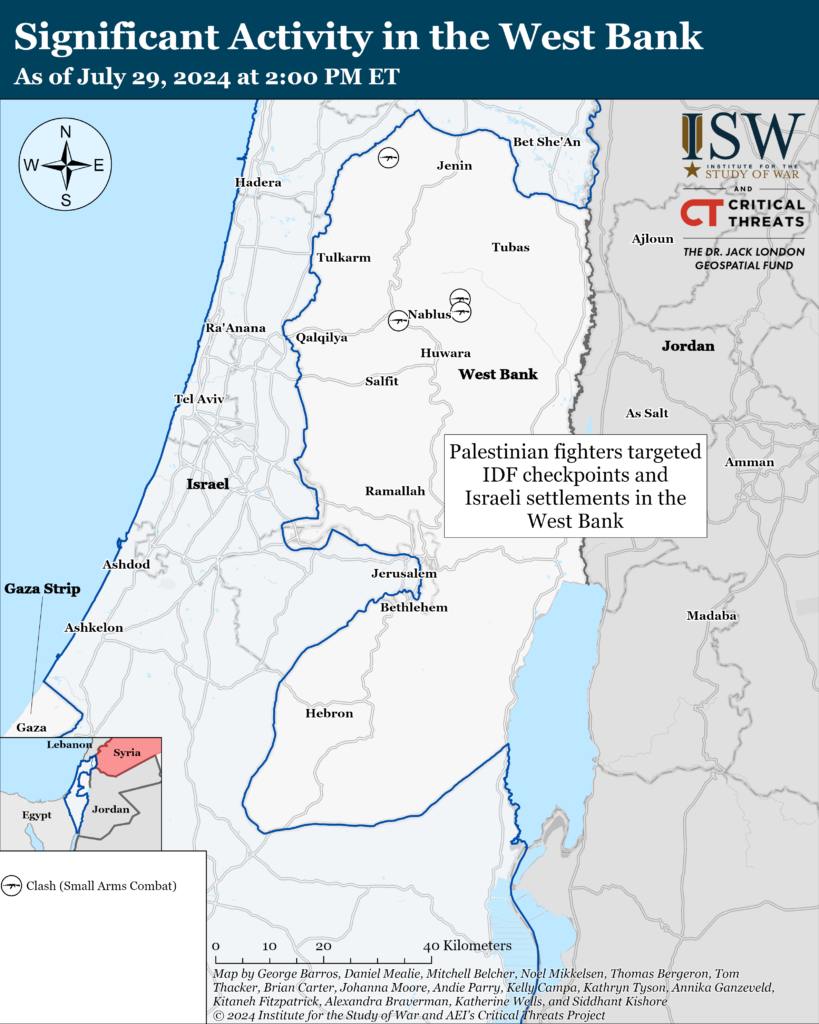
Southern Lebanon and Golan Heights
Axis of Resistance objectives:
Deter Israel from conducting a ground operation into Lebanon
Prepare for an expanded and protracted conflict with Israel in the near term
Expel the United States from Syria
Lebanese Hezbollah has conducted at least ten attacks into northern Israel since CTP-ISW’s last data cutoff on July 28.[lxx] The IDF detected a barrage of 20 rockets launched from Lebanon that landed near Kiryat Shmona and caused no casualties.[lxxi] The IDF also intercepted two drones launched from Lebanon.[lxxii] The IDF Navy intercepted one of the drones over Israeli territorial waters in the Mediterranean Sea.[lxxiii]
The IDF conducted strikes on Hezbollah fighters and infrastructure in southern Lebanon on July 29. The IDF struck Hezbollah infrastructure in Kfar Hammam that Hezbollah had used to launch rockets targeting Mount Dov.[lxxiv] The IDF also struck Hezbollah fighters in a vehicle between Mays al Jabal and Shaqra.[lxxv] Hezbollah mourned the two fighters‘ deaths and then claimed five attacks on northern Israel in response to the IDF’s strike between Mays al Jabal and Shaqra.[lxxvi] Axis media also reported that the IDF struck a vehicle in Kfar Roummane, Nabatieh Governorate.[lxxvii] These airstrikes are largely consistent with Israel’s daily targeting of Hezbollah infrastructure in southern Lebanon and are not the full Israeli response to the Majdal Shams attack.
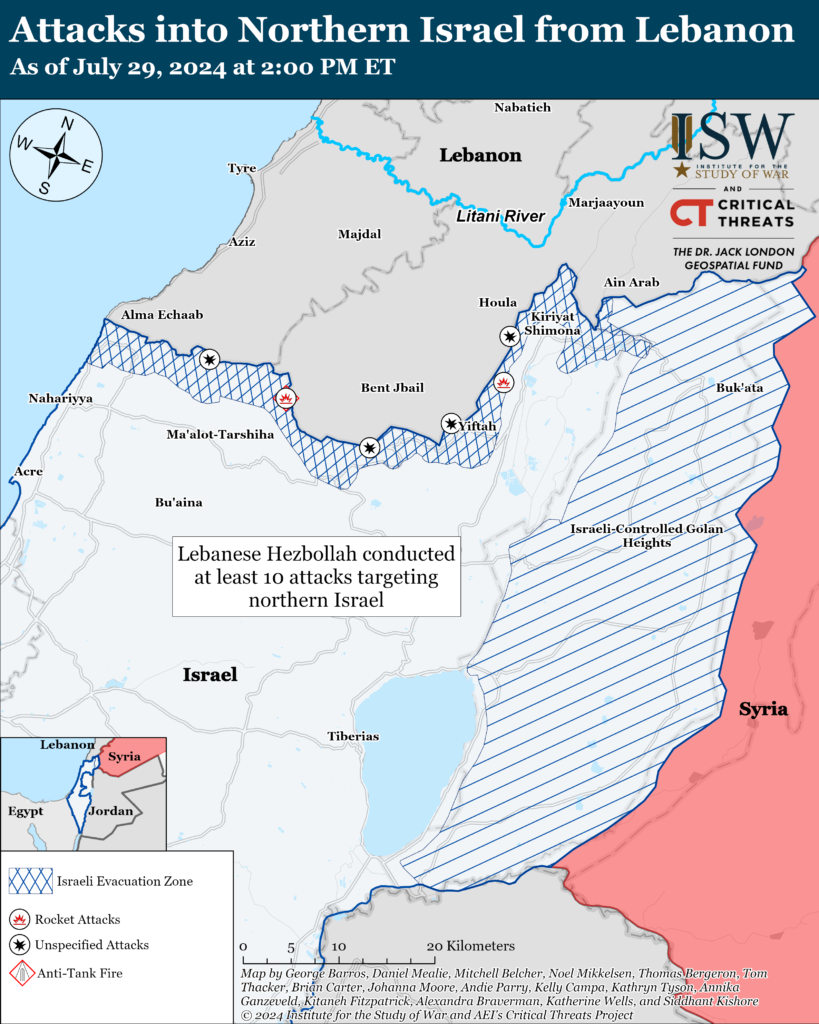
Iran and the Axis of Resistance
Russia’s second-largest bank, VTB Bank, will participate in the Iranian Stock Exchange, Banking, and Insurance Exhibition in Tehran between August 9 and 12.[lxxviii] An Iranian Economy Ministry official stated on July 27 that VTB Bank’s participation in the exhibition will mark the first time a Russian bank has participated in this annual event.[lxxix] The official stated that the value of VTB Bank’s assets in 2022 was 10 percent higher than the value of all Iranian banks’ assets in that same time period.[lxxx] The official also highlighted the importance of VTB Bank’s branches in China and India. VTB Bank previously opened a representative office in Iran in May 2023.[lxxxi]
The president of the Chinese Naval Engineering University, Admiral Peng Tao, visited the Imam Khomeini Naval University of Noshahr in Noshahr, Mazandaran Province, on July 29.[lxxxii] Peng Tao called for increasing educational, research, and technological cooperation with the Imam Khomeini Naval University of Noshahr.
The Islamic Revolutionary Guards Corps (IRGC) seized the Togo-flagged oil tanker Pearl G near the Arash Oil Field in the Persian Gulf on July 29.[lxxxiii] The IRGC accused the tanker of smuggling 700,000 liters of Iranian crude oil for an unspecified Iraqi businessman based in Dubai.[lxxxiv] The IRGC moved the vessel and its nine-person Indian crew to the Imam Khomeini Port in Khuzestan Province for “further investigation.”[lxxxv] The IRGC similarly seized the Togo-flagged, UAE-managed oil tanker Betelgeuse on July 21.[lxxxvi]
Acting Iranian Foreign Affairs Minister Ali Bagheri Kani met with Gambian Foreign Affairs Minister Mamadou Tangara and Cuban Deputy Foreign Affairs Minister Elio Rodriguez ahead of Iranian President Masoud Pezeshkian’s inauguration ceremony on July 30.[lxxxvii] Bagheri Kani and Tangara announced the resumption of diplomatic relations between Iran and The Gambia.[lxxxviii] Iran and The Gambia severed ties in 2010 after Nigeria seized an illegal arms shipment from Iran to The Gambia.[lxxxix] The Gambia denied that Iran was shipping arms to the country and subsequently severed diplomatic ties with Iran.[xc] Bagheri Kani and Tangara agreed to “develop friendly relations…based on the principles of mutual respect, equality, and common interests.”[xci] Bagheri Kani separately emphasized the importance of bilateral economic and political cooperation with Cuba and advocated for a more “active” approach to address “global threats” during his meeting with Rodriguez.[xcii]
Kurdistan Regional Government Foreign Affairs Minister Safeen Dizayee met with the Russian Consul General in Erbil, Maxim Rubin, on July 29.[xciii] Dizayee and Rubin discussed “current developments and regional dynamics,” probably in reference to recent Turkish operations in Iraqi Kurdistan against the Kurdistan Workers’ Party (PKK).
 Eurasia Press & News
Eurasia Press & News
